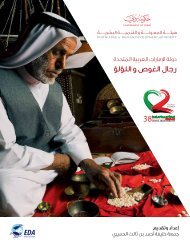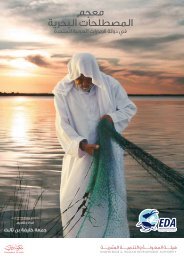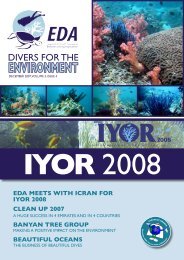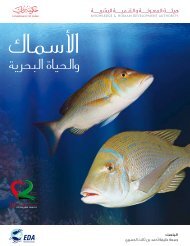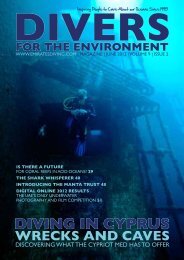Download - Emirates Diving Association
Download - Emirates Diving Association
Download - Emirates Diving Association
You also want an ePaper? Increase the reach of your titles
YUMPU automatically turns print PDFs into web optimized ePapers that Google loves.
NEWS<br />
NEWS<br />
About ‘My UAE Summer’ (Saif Belady)<br />
Inline with the directions of His Highness Sheikh<br />
Khalifa bin Zayed Al Nahyan – President of the<br />
UAE and His Highness Sheikh Mohammed bin<br />
Rashid Al Maktoum, UAE Vice President, Prime<br />
Minister and Ruler of Dubai and the members<br />
of the Supreme Council – Rulers of the<br />
<strong>Emirates</strong>; a program was developed to care<br />
for the youth and to develop activities to fill<br />
their leisure time during the summer months.<br />
The Ministry of Culture, Youth and Community<br />
Development and the General Authority for<br />
Youth and Sports Welfare developed the<br />
National Program for ‘My UAE Summer’<br />
activities with the collaboration of strategic<br />
partners, and supporters of the program.<br />
EDA coordinated the marine summer camp<br />
for this year and the Dubai Mall Aquarium<br />
sponsored the inauguration dive.<br />
EDA presentation at DUCTAC Summer Workshop<br />
Every summer DUCTAC (Dubai Community<br />
Theatre and Arts Centre) conducts a Summer<br />
Camp for children in the community, and this<br />
year they invited EDA to be involved. The<br />
workshops took place from the 30 th June to<br />
the 3 rd July, and involved kids between 5 and<br />
11 years old.<br />
Al Raqiah School presentation<br />
On the 29 th of May, EDA was invited to give a<br />
presentation in Al Raqiah School in Al-Ain. The<br />
school had just started their Oceans Week so<br />
the presentation was quite fitting to the theme<br />
and to what the kids were learning about at<br />
the time.<br />
The presentation was given to children of<br />
different age groups and each group was<br />
made up of around 30 students. It was fun as<br />
always to hear the interesting questions and<br />
to interact with the children, especially the<br />
younger ones!<br />
During the break, we were given a tour of the<br />
well-organised school and visited the Oceans<br />
room which had been decorated with all<br />
things related to the sea.<br />
The DUCTAC Summer Camp consists of a<br />
number of workshops wherein local children<br />
take part in arts and crafts activities and, for<br />
the first time this year, these workshops were<br />
themed. DUCTAC have an overall theme<br />
of Community and each set of workshops<br />
address a different side of our community<br />
here in Dubai: the undersea environment,<br />
recycling, health and safety and the performing<br />
arts (specifically music and theatre).<br />
During each week, DUCTAC invited likeminded<br />
groups to visit the Summer Camp and<br />
talk to the children about what they do. The<br />
children then created arts and crafts inspired<br />
by what they have learnt from the group talks<br />
and discussions.<br />
Cold Water <strong>Diving</strong><br />
BY andrew roughton<br />
Scuba diving is unlike most conventional<br />
sports. That is, it is not competitive. However,<br />
it does have many similarities with other<br />
conventional sports. For example, one<br />
should be physically fit enough to take part,<br />
one should only “compete” at one’s own<br />
level, and one should have the appropriate<br />
equipment to safely enjoy the sport under the<br />
expected weather conditions. The last point is<br />
particularly pertinent to cold water diving.<br />
Now, classifying cold water can be slightly<br />
challenging because, of course, it is subjective.<br />
It depends upon a person’s body shape, their<br />
attitude, and their equipment. However, it is<br />
fair to say that water temperatures from 35°C<br />
to 25°C do not require a wetsuit, 25°C to<br />
15°C do require an appropriate wetsuit, and<br />
15°C down to 5°C really require a drysuit.<br />
Moreover, to really enjoy scuba diving in water<br />
temperatures between 15°C and 5°C, one<br />
should also consider several other aspects of<br />
one’s dive plan.<br />
Firstly, one must consider one’s equipment.<br />
As previously discussed, selecting a wetsuit or<br />
a drysuit should be based on the individual<br />
diver’s experience. However, when a diver<br />
decides to use a drysuit, it is safe to say that<br />
an additional, thick (5mm plus) hood and<br />
gloves will be required. I also opt for an inner<br />
thermal suit and a thick pair of wooly socks<br />
underneath. There is no point in being macho<br />
about this. You must be properly protected to<br />
avoid the cold, enjoy your dive, and prevent<br />
the onset of serious cold water illnesses such<br />
as hypothermia. Of course, all these extra<br />
layers will make the diver more buoyant. Thus,<br />
extra weight is also a prerequisite for cold<br />
water diving. And a diver’s final equipment<br />
check should be to select regulators that are<br />
approved for cold water diving. Non-cold<br />
water regulators can freeze at the first-stage<br />
as a result of the cooling from gas expansion<br />
coupled with the cold water, which in turn<br />
creates an unwanted free-flow. Therefore,<br />
please be sure to confer with a specialist and<br />
select wisely when renting or purchasing your<br />
regulators for cold water diving.<br />
Secondly, one should be prepared for the cold<br />
water shock. Whether in a thick wet-suit or<br />
even a dry-suit, one can expect an initial shock<br />
when entering cold water. This is a physiological<br />
reaction known as the Mammalian <strong>Diving</strong><br />
Reflex, which creates a sensation that one<br />
cannot breathe properly when one’s head<br />
is submerged in cold water. Stay calm. This is<br />
perfectly normal and will pass. Similarly, even<br />
when accustomed to the water temperature,<br />
one should be equally prepared for the shock<br />
of cold water on the face when exhaling<br />
through the nose to clear a mask in cold water.<br />
Again, this is perfectly normal, but it does take<br />
some getting used to. Regular practice will<br />
easily overcome the shock of this task.<br />
Finally, if a diver feels cold, his or her air<br />
consumption rate will inevitably increase. That<br />
is, when a scuba diver becomes cold, s/he will<br />
burn more calories in order to stay warm,<br />
and thus consume more oxygen. Moreover,<br />
if a diver becomes very cold, his or her air<br />
consumption will increase further as a result<br />
of the extra work of shivering. So what is<br />
the solution? Wear suitable protection. As<br />
previously mentioned, do not be macho about<br />
your tolerance levels and do ensure that you<br />
have the right equipment to keep you warm.<br />
People can enjoy a variety of sports in all<br />
conditions. If it’s raining, one may wear a raincoat<br />
and still enjoy a round of Golf. If it’s baking<br />
hot, one may wear sunscreen, glasses and hat<br />
and still enjoy a game of tennis. If it’s snowing,<br />
one may cover oneself in deep-heat and still<br />
enjoy a game of Rugby. Scuba <strong>Diving</strong> needn’t<br />
be different. The visibility can be terrific, the<br />
marine life can be abundant, and the escapism<br />
can be unparalleled any time of year, so plan<br />
your cold water diving carefully and you can<br />
enjoy this wonderful, rewarding, and perennial<br />
sport no matter what the temperature may be.<br />
8 DIVERS FOR THE ENVIRONMENT, SEPTEMBER 2013<br />
SEPTEMBER 2013, DIVERS FOR THE ENVIRONMENT 9



